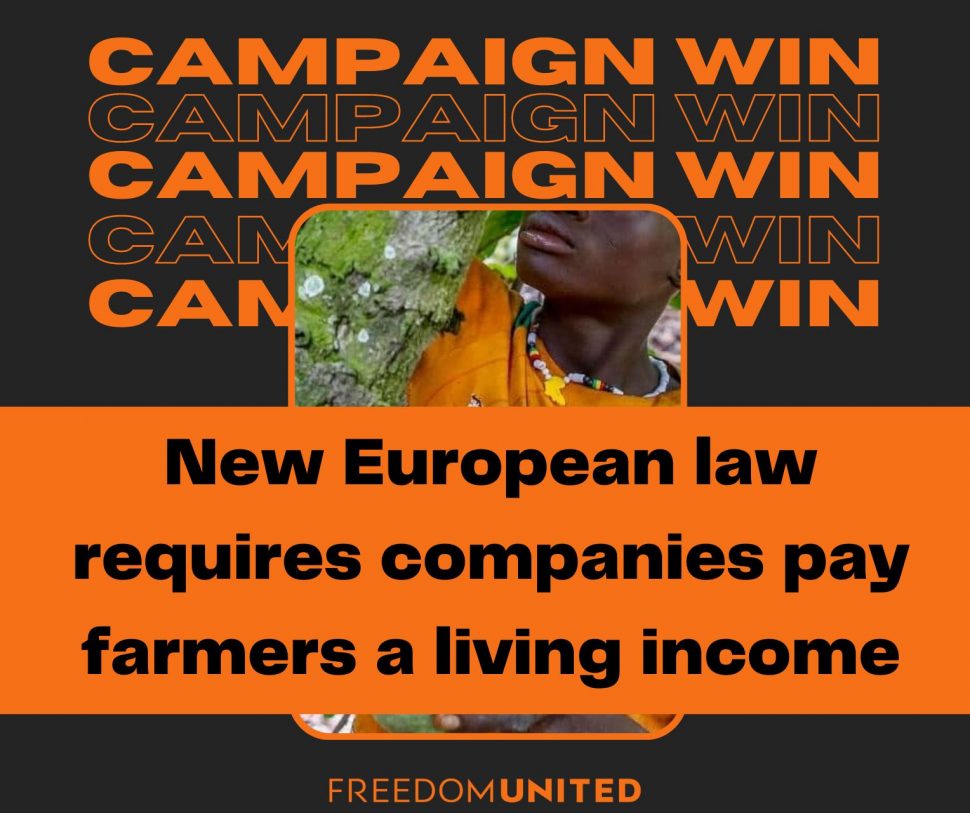Goal:
To mandate European companies to ensure smallholder farmers receive a living income, including through fair purchase practices, to prevent forced child labor in the cocoa industry.
Summary:
During the negotiation rounds of the European Union’s new law, the Corporate Sustainability Due Diligence Directive or CSDDD, we launched an action through which the Freedom United community reached out to key negotiators advocating for the inclusion of living income and fair purchasing practices in the directive.
A living income provision helps because chocolate companies often pay extremely low prices for cocoa, which drives farmers into poverty, increasing the risk that they will turn to forced and child labor to tend to and harvest their crops. Ensuring a living income addresses these root causes, helping to eliminate child and forced labor among smallholder cocoa farmers.
However, after the draft text, with a living income provision, was agreed upon by the European Council and Commission, the German Liberal party withdrew their support, causing Germany to abstain and other countries to follow suit. This led to a significant reduction in the directive’s scope.
In response, we launched a second action through which supporters urged the German government to change their stance and vote yes, emphasizing the importance of including living income in the directive. We then shared the petition with Chancellor Scholz and relevant German MEPs. Our partners, in direct touch with them, used the signatures to show support and increase pressure for the directive’s passage.
Timeline of events:
October 24, 2023: Action to “Urge the E.U. to push for a living income for cocoa farmers!” is launched. Our supporters sent emails to the relevant E.U. negotiators, demanding the inclusion of living income and fair purchase practices in the CSDDD.
December 2023: Agreement on the CSDDD was reached in the European Council. The European Parliament already announced its support, so we were optimistic.
January 2024: Germany announced that it would abstain from the vote and lobbied other countries to follow suit. The passing of the law was threatened.
February 9, 2024: The vote on the CSDDD was pulled from the agenda as it became evident that the likelihood of it passing was too low.
February 20, 2024: The action “Urge the German government to vote YES to the CSDDD!” launched. Our supporters could sign a petition urging Olaf Scholz to change his mind and vote yes instead of abstaining to pass the CSDDD.
February 28, 2024: The postponed vote took place, but there was not sufficient support for it to be endorsed by the Council. The E.U. institutions went back into negotiations, resulting in a significantly reduced scope of the directive.
May 24, 2024: The CSDDD was passed! It includes specific provisions on living income and fair purchase practices. Germany abstained from the vote, but it passed anyway.
July 25, 2024: The CSDDD enters into force.
Outcome:
On May 24, 2024, new legislation, the CSDDD, was passed and is set to enter into force two months later, that includes specific provisions for corporate action on living income and fair purchase practices, addressing the core issues of poverty and child labor among smallholder cocoa farmers. Despite Germany’s abstention from the vote, the directive successfully passed, marking a significant victory for our campaign, despite its limitations.
This milestone ensures that companies must now identify, prevent, and mitigate human rights and environmental abuses in their supply chains. They are required to integrate due diligence into their policies, address adverse impacts, establish complaint mechanisms, and publicly report their efforts. With the CSDDD in place, companies must guarantee a living income for farmers, promoting stability and sustainability in their livelihoods and advancing a fairer, more ethical cocoa industry.


-
Follow us on Facebook
5.6M
-
Follow us on Twitter
32K
-
Follow us on Instagram
8K
-
Subscribe to our Youtube
5.7K
Donate